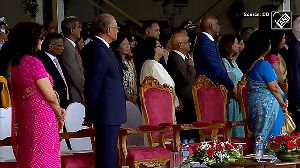'Truth in wartime is such a precious commodity that she has to be guarded by a bodyguard of lies'
-- Winston Churchill
Ever since Independence, India and Pakistan have been at war, either overt or covert. In such circumstances, truth is the first casualty.
There is much speculation in India about the identity of the brigadier, who according to Captain (retd) Gohar Ayub, the former foreign minister of Pakistan, had sold Indian Army plans to Pakistan for Rs 20,000, before the 1965 Indo-Pak war.
Ayub's claims of insider knowledge are based on the fact that he is the son of the first Pakistani military dictator, self styled Field Marshal Ayub Khan.
Govt to investigate Ayub's claims | Army launches probe
A little backdrop to the 1965 clash of arms between India and Pakistan is necessary to unearth the truth.
The conflict went through three distinct phases. First was the 'trial' attack on some posts in Rann of Kutch in early 1965. Then came a period of peace that lasted till August, when Pakistan launched infiltrators in Kashmir. When checked in that venture she launched an armoured assault in the Chaamb area of Jammu and Kashmir on September 1.
In response to this the Indian Army launched an all out offensive all along the International Border on September 6, with initial thrust in the direction of Lahore.
The surprise attack ensured that in less than six hours, the Indian spearhead had reached the Bata shoe factory on the outskirts of Lahore.
I was told by a Pakistani army subedar of the Baluch regiment that when news of the Indian attack came, his battalion was actually doing morning PT (Physical Training) in shorts and canvas shoes. According to him, the men were rushed straight from there to armoury and defence bunkers.
When the Americans sought to evacuate their citizens from Lahore, they sought Indian permission and temporary secession of hostilities to land their aircraft in Lahore.
Jingoism is my prerogative, says Gohar Ayub
But for a leadership failure on the Indian side -- the general commanding the division actually panicked at the swift advance and instead of reinforcing the successful thrust, actually asked the Jats who had crossed the Ichchogil canal to fall back --- Lahore would have been reached on day one itself!
A person with greater nerves there would have seen the Indian Army beyond Lahore within days. Indian initial gains were also formidable following the attack carried out later in the Sialkot sector.
It is true that India did not achieve the kind of comprehensive victory in 1965 that it did in 1971. But causes of that lie elsewhere.
In 1965, Pakistan had both qualitative and quantitative edge over us. To face their modern Patton tanks we had World War II vintage Shermans. In artillery, we had 25 pounder guns while they had 155 mm heavy guns,(it was in 1984 that we got our first 155mm gun, the Bofors).
In the aftermath of 1962, even some infantry was moved to China border. The new units that were being raised were as yet untrained and not fully equipped. In addition since the Chinese created a diversion in Sikkim, and in September the northern passes were still open (unlike in 1971), not many troops could be moved away from the China border.
Thus, there was a rough parity in numbers and qualitative edge for Pakistan. In spite of all these factors, India actually gained territory in most of Punjab. We did indeed suffer a loss in Chhamb then as well as in 1971. But the reason for that is the peculiar geography of that sector that puts us at a distinct disadvantage.
Those of us who heard Ayub's broadcast on September 6, 1965, detected a note of panic and desperation. If, as Gohar now claims, Pakistan had in its possession the entire Indian plan of action, then the Pakistani army had to be extraordinarily stupid, which it is not.
Interview: Lt General P N Hoon (retd)
Near military parity coupled with this knowledge ought to have thwarted every Indian attack, but it did not.
Could it be that a bogus plan was deliberately planted on Pakistan?
In the Second World War, to fool the Germans about the actual site of Allied landings, the Allies had deliberately handed over the 'plan' to the Germans, planted on a dead body.
Nearer home, many remember the hijack of the Indian Airlines Fokker Friendship aircraft Ganga in the early part of 1971. The aircraft was hijacked by two Kashmiris, Butt and Hashim Quereshi. One of them was a Border Security Force man.
The Pakistanis fell into the trap, hailed them as heroes and burnt the aircraft. This gave India the excuse to ban overflights by Pakistani aircraft, which had a significant impact on situation in erstwhile East Pakistan, now Bangladesh.
The Pakistanis soon realised their folly, branded the hijackers as Indian agents and sentenced them to prison terms. What made the affair curious was the fact that Ganga was one of the oldest aircraft in the Indian Airline fleet and was already withdrawn from service but was re-inducted days before the 'hijack'.
Even more tellingly, a deputy inspector general of the BSF based in Jammu, bristling at the involvement of one of his men in hijack, had gone public to say that he had objected to the induction of Butt into the BSF but was overruled by a 'higher intelligence agency'.
Pakistan continues to assert that the episode was stage managed by India. The Indian side has, for obvious reasons, never responded to this charge.
Gohar Ayub warns India of vengeance
Coming back to Ayub's charge, to sell such a valuable document for mere Rs 20,000, the said brigadier must either be very foolish or was asked to plant fake documents. The later seems more likely.
If that is so, then like the Ganga episode the Indian side is not likely to come out in the open to accept or deny it. But to an average citizen it is gratifying to know that we are indeed capable of such a feat.
That brings us to the motives behind Gohar Ayub's 'disclosure.'
When Gohar Ayub was removed as foreign minister of Pakistan, there was gloom in New Delhi's South Block, which houses the foreign and defence ministries. For such was his 'foot in mouth' disease that he did much to promote Indian interests by default. This latest disclosure may well be part of his attempt to return to the limelight.
The people of India should see the whole thing as comic relief and find solace in the prowess of Indian intelligence.
Colonel (Dr) Anil Athale (retd) is a former Joint Director of War History, Ministry of Defence.






 © 2025
© 2025